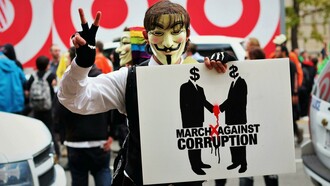"Cancer goes so much further than just being sick," I read in a newspaper. I can imagine it very well. When you are seriously ill and even when you have overcome cancer, you will have very limited access to life insurance, let alone debt balance insurance for the mortgage on your house. Looking for work is made extra difficult if your potential boss knows you have had cancer before. If you have to undergo chemotherapy, your leisure time will look completely different from when you are healthy. The relationship with your partner will inevitably be under severe stress. Psychological anxiety can devastate your life.
All true. However, is there anyone who dares to say that cancer is a 'multidimensional' problem? That it is a 'wicked problem' and no one knows at which end to start to eradicate it? Of course not. If you have cancer, you need a good oncologist and serious treatment. If you get help with all of those 'side problems', all the better, but medical treatment comes first.
Not so with poverty. Poverty is so much more than a lack of money or income, the mantra goes. There is a ‘lack of opportunities’ and there is energy poverty, transport poverty, housing poverty, and menstrual poverty. Policies are put in place to address all of these 'side dimensions', for better or worse, but who wants to give poor people sufficient income?
The definitions you work with are important. If you want to eliminate poverty from the world, it is best to work with a definition that is as concise and concrete as possible and that immediately states the goal. If the aim is to study poverty in all its aspects, then your definition cannot be broad and wide enough. Take the example of someone who has a more than decent income but is unable to manage money. That man or woman will soon be deeply in debt, but can you then talk about someone being 'poor'? That person should certainly be helped with debt and/or budget management, but it does not seem to me to be a problem of 'poverty'.
It is true that poor people will not be able to afford the doctor or school, precisely because in almost all countries, there is a market economy in which you need money to survive. If there are free public services, for health care, education, or culture, the need for money will not be as important. Unfortunately, most of these services have been privatised.
Poor people also live in constant stress and often struggle with psychological problems. Violence is common in poor families, very often out of frustration. Fear of tomorrow can run so high that people are no longer able to rationally deliberate on what can and cannot be done. Being poor means constantly having to make choices: pay for school meals or buy new shoes? Get the bike repaired or a new computer? Children growing up in poverty can suffer throughout their lives, with a sense of inferiority, of not belonging, even if they can escape poverty as adults and live a 'normal' life. Poverty gets under your skin and, according to some authors, it even creeps into your DNA.
At all these subsidiary levels, non-financial help can be very useful. In most rich countries, there certainly are enough competent social workers who do their job excellently and can assist and guide people. But suppose: if all people got a decent income, wouldn't many of these problems disappear like snow in the sun? Being able to rent a house, go to the doctor and the pharmacist, spend a day at the seaside with the children... Wouldn't the stress and anxiety about tomorrow's day not be gone when there is happily no piece of the month left at the end of one's salary or benefit?
That people can have problems even then goes without saying, one need not be poor for that reason. Non-poor people today have a 'coach', poor people a social worker. It points to the ‘otherness’ we put poor people in, the 'otherness' they find hard to escape from because non-poor people push and keep them in it. Poor people form a distinct group, a peripheral humanity, at least, if they are 'one of us', otherwise they fall into the category of freeloaders and fortune seekers—think of migrants.
The problem is that while defining poverty, several different meanings are confused. "Subsistence security is a prerequisite for getting out of poverty," I read on Facebook, "but it is not sufficient". This is difficult to understand. Or Tim 's Jongers, a Dutch author: "Poverty is so much more than having no money. And poverty unfortunately does not leave you even when you have money".
This is problematic because it juggles two different meanings of 'poverty' and thereby loses sight of what the intention should be. The first intention is to make people self-reliant—not to solve all psycho-social problems. People should have sufficient income to be able to take care of themselves and live autonomously. It is true that psychological problems can remain, but are these problems different from other non-poor childhood traumas? Are we then still talking about ‘poverty’?
Poverty is an income deficit. Stating this does not mean ignoring all other supposedly multidimensional problems—it does mean prioritising them correctly. In current policy practice, however, income is too often pushed back. By turning it into a 'wicked problem', where you no longer know where and how to start, by confusing causes and effects, by allowing clear definitions to be polluted by sloppy and misleading statements, the problem gets bogged down in an opaque and inextricable mire of words. Whereas, with a decent income, most side problems disappear like snow in the sun.
Poverty is income deprivation. Solving that means people can pay the rent and have bread on the table. And can participate, if they wish, in social life. It does not mean that you can solve poverty just by giving people money. It does mean that you have to commit to a roof over one's head, to a benefit, to a job. With each time in mind, how does this lead to an income that allows for a life with dignity? With a guarantee for a living wage or an allowance at least at the level of the poverty line.
Anyone who wants to fight poverty must first of all ensure that poverty is no longer produced. Because not only do we live in an inequality machine, as some authors call our economic system, we also live in a poverty factory, and that is the only factory that urgently needs to close. All austerity programmes that want to avoid a wealth tax or a tax on assets work in the poverty factory.
All the attempts to cut unemployment benefits, every post office or station that closes, every ATM that breaks down, every bus stop that disappears, every robot that answers your phone call (click one click two...), these are practices that exclude and cooperate with the poverty factory. Every collective bargaining that disappears, every restriction on the right to strike or protest, they undermine democracy and end up in the poverty factory.
Poverty should not exist in rich societies. Poverty must be completely eradicated and prevented with a welfare state and with fair taxation. Plus a poverty policy that focuses on income and self-reliance. As for poor countries, the World Bank just communicated that the goal of eradicating poverty by 2030 should be delayed by at least 30 years. It will then be almost 100 years since the first promise to eliminate poverty in the short term was made.
We are still underestimating the logic behind all the nice stories about poverty reduction. Because no, most anti-poverty policies do not want to eradicate poverty; on the contrary, they want to perpetuate it in order to conceal the real problems, the growing inequality and the immense wealth that is increasing while the bottom of society is impoverished. And with some charity added to it, pretending we are doing good. With a focus on poverty reduction, one can easily dismantle welfare states that offer social citizenship, because poverty reduction is perfectly compatible with neoliberalism.
Poverty is not what poor people tell about their lives and from which non-poor people then draw a conclusion. Because yes, they tell about an overpriced supermarket and pharmacist and the far too high rent. And about the anxiety it causes. The despair. With some money, anything can be paid for. Poverty comes from a political and economic factory that produces poverty. It is an ideological construct that spreads knowledge and truth, that causes us to lose sight of the forest for the trees and not even dare to name that forest.
Poverty must be eradicated from the world. Poor people are rightly concerned about putting bread on the table in the first place. Great moral principles do not help if you are hungry or without a roof over your head. Hatred and intolerance find a breeding ground in the many incongruities and red tape of current policies and in the fog raised around simple problems. Time and again, it is ordinary people who have to foot the bill for a fundamentally unjust system that outrageously promotes, allows, and tolerates gross inequalities. The policy then goes in search of the poorest of the poor and looks at child poverty while the dads and mums are denied benefits. That has to stop. Call a spade a spade. Make poverty illegal and make it disappear forever instead of permanently work with useless end-of-the-pipe strategies.















